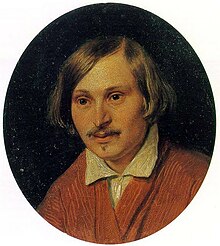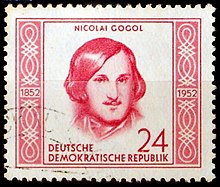Nikolai Wassiljewitsch Gogol
Nikolai Gogol ( Russian Николай Васильевич Гоголь ; emphasis: Nikolai Gogol ; born March 20, jul. / 1. April 1809 greg. In Velyki Sorochyntsi ; † February 21 jul. / 4. March 1852 greg. In Moscow ) was a Russian writer of Ukrainian origin (then referred to as " Little Russia "). He is one of the most important representatives of Russian literature .
Life
Childhood and youth
Nikolai Gogol was born on April 1, 1809 as one of five children of the Ukrainian landowner family of Vasily Afanassjewitsch and Marija Ivanovna Gogol-Janowski. The name Gogol is reminiscent of Cossack ancestors, and some historians believe it is possible that Ostap Hohol , a hetman of right-bank Ukraine , was an ancestor of Nikolai Gogol. The father was considered a dreamer and was an occasional author of Ukrainian teasers. The mother was fourteen when the bridegroom, twice his age, was introduced to her.
Gogol was ten years old when his younger brother died and sixteen when his father passed away.
During his school attendance at the grammar school in Nischyn Gogol suffered from scrofula and managed to escape the ridicule of his classmates by exaggerating. He was short, crooked and thin, with poor skin and an excessively long, pointed nose. Contemporaries puzzled over his sullen, concentrated, gloomy, clever and sick nature. The 18-year-old Gogol noted: "Everyone thinks I'm a riddle".
Phase of success
After his first literary attempts, he came to the capital Saint Petersburg in 1828 and failed when trying to get a job at the university there. Gogol took a trip to Germany and tried, equally unsuccessfully, to become an actor. In 1829 he got a job in the civil service. In 1831, however, he gave up his job again and became a history teacher at a private school for girls.
In 1831 Gogol met the poet Alexander Pushkin , who showed him the way into Russian literature. Pushkin became his friend and patron. Pushkin, for example, suggested writing Die Revisor and Die toten Seelen - both works later received the highest recognition. Pushkin also repeatedly provided Gogol with work as a private tutor and university professor, although Gogol never held these activities for long. At the end of 1833, with the support of Alexander Pushkin and Vasily Schukowski , he applied for the Chair of General History at St. Vladimir University in Kiev , because he wanted to leave Saint Petersburg because of the climate. However, the then unknown historian Volodymyr Zych was preferred to him. So in 1834 Gogol became adjunct professor at the chair of general history at the University of Saint Petersburg . He had to give up this position in December 1835 because he did not have the formal qualifications required by a new university law.
He began to write and celebrated a surprise success with his folk Ukrainian stories evenings in the hamlet near Dikanka (Вечера на хуторе близ Диканьки, 1831/32). It is the unique combination of the coarse Vertep comedy with the Ukrainian local color and fairy-tale, sometimes eerie fantasy that made the story book a success. The comedy still predominated in the depiction of the devils and witches, but already here the tendency towards the all-pervasive demonic, which fully developed in Gogol's later works, became clear. Another collection of four stories on the Ukrainian theme, Mirgorod (Миргород, 1835), continued the success of the evenings and anticipated crucial moments in Gogol's more mature works.
With the so-called Petersburg stories (Петербургские повести, 1842) Gogol turned to the northern metropolis and new topics: They show the life of civil servants, officers and craftsmen in the big city, where vice and greed and where the demonic is everywhere in everyday life can manifest. Officials are also caricatured in his comedy The Auditor (Ревизор, 1836), the subject of which goes back to a suggestion by Pushkin. His main work Die toten Seelen (Мертвые души, 1842), which he wrote on his travels from 1836 to 1842 through Germany, France, Switzerland and especially Italy, aptly shapes the sometimes cocky and corrupt way of life of the Russian landed nobility. As landowners, many nobles lived a secluded life on their estates. Her sons mostly went to the army as officers, where they played and dueled. The peasants were serfs .
He belonged to the St. Petersburg salon of Evdokija Petrovna Rostoptschina , which also included Ivan Myatlew, Lev Alexandrovich Mei , Pyotr Pletnjow and Count Odojewski .
Literary decline and death
Between 1836 and 1848 Gogol traveled through Germany, Switzerland, Austria, France and Italy, but he went through a serious creative crisis. He also began to suffer from paranoid-hallucinatory psychosis , a form of schizophrenia .
Gogol went on a pilgrimage to Palestine. On his return he came under the influence of a priest who regarded his works as corrupt. He burned the manuscript of the second part of The Dead Souls - possibly in a delusional fit - but shortly thereafter described this as a major mistake.
The psychosis finally completely destroyed the once busy literary figure: Gogol died of the consequences of strict religious fasting at the age of 42. After his death, many of his friends wondered if they had ever really known Gogol.
Works
-
Evenings in the hamlet near Dikanka (1831/1832)
- First part:
- Second part:
-
Mirgorod (1835)
- First part:
- Second part:
-
Master novels
- The Nevsky Prospect (1835)
- The nose (1836)
- The portrait (1842)
- The coat (1842)
- The carriage (1836)
- Notes of a Madman (1835)
- Rome (1842)
-
Comedies
- The Auditor (Premiere 1836)
- A Busy Man's Morning (1836)
- The marriage (premiere 1842)
- The Players (Premiere 1843)
- The trial (premiere 1844)
- Dramatic Fragments (published in 1842)
- The Dead Souls (1842)
- Selected passages from correspondence with friends (1847)
literature
- Lorenzo Amberg: Church, liturgy and piety in the work of NV Gogol. Peter Lang, Frankfurt am Main a. a. 1986, ISBN 3-261-03656-7 .
- Peter Deutschmann: Intersubjectivity and Narration. Gogol, Erofeev, Sorokin, Mamleev. Peter Lang, Frankfurt am Main a. a. 2003, ISBN 3-631-50198-6 .
- Susi K. Frank: The discourse of the sublime in Gogol and the Longin tradition. (= Theory and history of literature and the fine arts. 98). Fink, Munich 1999, ISBN 3-7705-3415-8 .
- Melissa Frazier: Frames of the Imagination. Gogol's Arabesques and the Romantic Question of Genre. (= Middlebury studies in Russian language and literature. 22). Peter Lang, Frankfurt am Main a. a. 2000, ISBN 0-8204-4507-X .
- Urs Heftrich: Gogol's guilt and atonement. Attempt to interpret the novel "The Dead Souls". Pressler, Hürtgenwald 2004, ISBN 3-87646-100-6 .
- Kjell Johansson: Gogol's World. Novel. Claassen, Munich 2000, ISBN 3-546-00199-0 .
- Rolf-Dietrich Keil: Nikolai W. Gogol. With testimonials and photo documents. Rowohlt, Reinbek near Hamburg 1998, ISBN 3-499-50342-5 .
- Andreas Krziwon: The comic in Gogol's stories. Peter Lang, Frankfurt am Main a. a. 1994, ISBN 3-631-46147-X .
- Andreas Larsson: Gogol and the problem of human identity. The “Petersburg Tales” and the “Auditor” as examples of a fundamental theme in the works of NV Gogol. Sagner, Munich 1992, ISBN 3-87690-518-4 .
- Birgit Seidel-Dreffke: The main tendencies of international Gogol research in the second half of the 20th century (German-speaking area, USA, Great Britain, Soviet Union). Haag and Herchen, Frankfurt am Main 1992, ISBN 3-89228-803-8 .
- Christian von Tschilschke : Epics of the Trivial: NV Gogols “The Dead Souls” and G. Flaubert's “Bouvard and Pécuchet”. A structural and thematic comparison. Winter, Heidelberg 1996, ISBN 3-8253-0389-6 .
- Peter Urban (Ed.): Gogol's Petersburg Years. Gogol's correspondence with Pushkin. A story in letters. Friedenauer Presse, Berlin 2003, ISBN 3-932109-30-9 .
- Natascha Drubek-Meyer: Gogol's eloquentia corporis. Incorporation, Identity, and the Limits of Figuration. Sagner, Munich 1998, ISBN 3-87690-725-X . ( Digitized version )
- Vladimir Nabokov: Nikolaj Gogol. Vladimir Nabokov, Collected Works, Volume XVI, Rowohlt, Reinbek near Hamburg, 1990, ISBN 978-3498046545 .
Russian authors
- ST Aksakov: Istorija moego znakomstva s Gogolem . Izdanie podgotovili sotrudniki Muzeja "Abramcevo" TO SSSR EPNaselenko i EASmirnova. Izdatel´stvo Akademii Nauk SSSR, Moskva 1960.
- Andrej Belyj: Mastersvo Gogolja . (The Art of Gogol). Reprint of the Moscow 1934 edition with an introduction by Dmitrij Čiževskij. Wilhelm Fink Verlag, Munich 1969.
- Michail B. Chrapčenko: Izbrannye trudy - Nikolaj Gogol ' Literaturnyj put', velikie pisatelja. Moskva 1993.
- II Garin: Zagadočnyj Gogol´ . Moskva 2002
- Jurij V. Mann: Poëtika Gogolja . Variacii k teme.Coda, Moskva 1996.
- SI Mašinskij: Gogol´ v vospominanijach sovremennikov . Moskva 1952.
- V. Veresaev: Gogol´ v žizni . Sistematičeskij svod podlinnych svidedel´stv sovremennikov. ACADEMIA Moskva-Leningrad 1933.
- V. Veresaev: Kak rabotal Gogol´ . Cooperativnoe Izdatel´stvo "Mir". Moskva 1934.
- Igor Zolotussky: Gogol´ . Izdanie vtoroe, ispravlennoe i dopolnennoe. Iz serii "Žizn´ zamečatel´nych ljudej", Molodaja Gvardija Moskva 1984.
Film adaptations
Film versions of “Der Revisor” see there
Film versions of “Der Mantel” see there
Film versions of “Der Wij” see there
- 1913: The Night Before Christmas (Ночь перед Рождеством) - directed by Władysław Starewicz
- 1913: The Terrible Vengeance (Страшная месть) - Director: Władysław Starewicz
- 1936: Taras Bulba ( Tarass Boulba ) - directed by Alexei Granowski - based on the novel of the same name
- 1952: Mainacht ( Majskaja notsch, ili utoplenniza ) - directed by Alexander Rou - based on the story of the same name
- 1960: The Dead Souls ( Mertwyje duschi ) - Director: Leonid Trauberg - based on the novel of the same name
- 1962: Taras Bulba ( Taras Bulba ) - director: J. Lee Thompson - based on the novel of the same name
- 1961: The night before Christmas ( Wetschera na chutore blis Dikanki ) - Director: Alexander Rou - after the series of novels Evenings in the hamlet near Dikanka
- 1963: The Cossacks Come ( Taras Bulba, il cosacco ) - Director: Ferdinando Baldi - based on the novella Taras Bulba
- 1968: The evening before the Iwan Kupala festival ( Wetscher nakanune Iwana Kupaly ) - director: Jurij Ilyenko - based on the novel The evening before St. John's Day
- 1977: The marriage ( Shenitba ) - director: Witalij Melnikow - based on the comedy of the same name
- 1977: Call me into the bright distance ( Posowi menja w dal swetluju ) - Director: German Lavrow , Stanislaw Lyubschin - based on the comedy Die Marriage
- 1983: In the Land of the Mirage ( Delibabok orszaga ) - Director: Márta Mészáros - based on the comedy The Auditor
- 2002: Evenings in the hamlet near Dikanka ( Wetschera na chutore blis Dikanki ) - Director: Semjon Gorow
- 2004: The Sorochinsy Fair ( Sorochinskaya Jarmarka ) - Director: Semjon Gorow
- 2005: The Dead Souls ( Delo o mertwych duschach ) - Director: Pawel Lungin
- 2007: Russisches Spiel ( Russkaja Igra ) - director: Pawel Tschuchraj - based on the comedy The Gamblers 1836
- 2009: Taras Bulba ( Taras Bulba ) - Director: Wladimir Bort'ko
- 2017: Gogol - The Beginning ( Gogol natschala ) - Director: Egor Baranov
Radio plays
- 1946: The Missing Certificate - Director: Cläre Schimmel ( SDR )
- 1946: The Auditor - Director: Fritz Benscher ( BR )
- 1946: The Players - Director: Unknown ( HR )
- 1946: The Auditor - Director: Unknown (HR)
- 1946: The Bride Show - Director: Karlheinz Schilling (HR)
- 1946: The Players - Director: Hanns Korngiebel ( RIAS )
- 1947: The Marriage - Director: Walter Ohm (BR)
- 1948: The New Coat - Director: Fritz Benscher (BR)
- 1948: The New Coat - Director: Günter Siebert ( RB )
- 1949: The Auditor - Director: Rudolf Hahn ( Mitteldeutsche Rundfunk AG )
- 1949: The Players - Director: Heinrich Müller-Eschborn (SDR)
- 1949: The Bride Show - Director: Werner Wieland (Mitteldeutsche Rundfunk AG)
- 1949: The Auditor - Director: Boleslaw Barlog ( NWDR Berlin)
- 1949: The Auditor - Director: Oskar Nitschke (SDR)
- 1950: The Dead Souls - Director: Albert Carl Weiland ( Radio Saarbrücken )
- 1950: The Coat - Director: Heinz von Cramer (RIAS)
- 1952: The coat and the nose - Director: Wilm ten Haaf (Radio Saarbrücken)
- 1952: The Auditor - Director: Walter Ohm (BR)
- 1952: The Coat - Director: Wilhelm Semmelroth (SDR)
- 1952: The New Coat - Director: Wilhelm Semmelroth (SDR)
- 1952: The Nose - Director: Gert Westphal (RB)
- 1952: The Players - Director: Werner Wieland ( Broadcasting of the GDR )
- 1952: The Marriage - Director: Gottfried Herrmann (Broadcasting of the GDR)
- 1952: Pott will freen (Low German dialect radio play based on: The Marriage ) - Director: Eberhard Freudenberg (RB)
- 1953: The Dead Souls - Director: Richard Hilgert (Broadcasting of the GDR)
- 1953: The Bride Show - Director: Jöns Andersson (NWDR Hannover)
- 1953: The Nose - Director: Raoul Wolfgang Schnell (NWDR Cologne)
- 1954: The Nose - Director: Otto Kurth (SDR)
- 1954: The Auditor - Director: Ulrich Lauterbach (HR)
- 1955: Dead Souls - Director: Carl Nagel (RB)
- 1955: The big noise of the great men - Director: Oskar Nitschke (SDR)
- 1955: The Gänserich - Director: Hans Rosenhauer (NWDR Hannover)
- 1956: The Bridal Trip to Petersburg - Director: Willy Purucker (BR)
- 1956: The Nose - Director: Unknown (NWDR Hannover)
- 1958: Pott wants to marry (Low German version of Die Heirat ) - Director: Hans Tügel ( NDR )
- 1959: The Marriage - Director: Walter Knaus (SDR)
- 1960: The Auditor - Director: Herwart Grosse (Broadcasting of the GDR)
- 1960: The Night Before Christmas - Director: Friedhelm Ortmann ( WDR )
- 1963: The Dead Souls - Director: Friedhelm Ortmann (SDR)
- 1965: The Nose - Director: Gerd Beermann (SDR)
- 1974: Der Wij - Director: Karlheinz Schilling (HR)
- 1974: The Night Before Christmas - Director: Friedhelm Ortmann (WDR)
- 1975: How it came that Iwan Iwanowitsch fell out with Iwan Nikiforowitsch - Director: Albrecht Surkau (Broadcasting of the GDR)
Web links
- Literature by and about Nikolai Wassiljewitsch Gogol in the catalog of the German National Library
- Works by and about Nikolai Wassiljewitsch Gogol in the German Digital Library
- Works by Nikolai Wassiljewitsch Gogol in Project Gutenberg ( currently usually not available for users from Germany )
- Works by Nikolai Wassiljewitsch Gogol in the Gutenberg-DE project
- Works by Nikolai Wassiljewitsch Gogol at Zeno.org .
- Over 180 publications are listed in the RussGUS database (there search - simple search: gogol, *)
- "The nose" as a free audio book at vorleser.net
- Short English biography of Nikolai Gogol ( Memento from January 10, 2015 in the Internet Archive )
- Calendar sheet at br-online ( Memento from September 30, 2007 in the Internet Archive )
- Oleg Jurjew : Man without qualities . In: Der Tagesspiegel ( Berlin ), JURJEWS KLASSIKER
- Hanns-Martin Wietek: Nikolai Wassiljewitsch Gogol, the Russian soul
- Full texts in Lib.ru (Russian)
- Full texts in the Komarov library (Russian)
Individual evidence
- ^ Russians in Baden-Baden
- ↑ Was Hetman Ostap Gogol the ancestor of NW Gogol? on the Gogol House website; accessed on April 10, 2016 (Russian)
- ^ Prototype of Gogols Taras Bulba - a distant ancestor of the writer, Hetman Ostap Gogol on gazeta.zn.ua; accessed on April 10, 2016 (Russian)
- ↑ a b c d nzz.ch: Where does it hurt, Nikolai Wassiljewitsch? . March 28, 2009.
- ↑ a b derStandard.at: The fourth dimension of prose . March 27, 2009.
- ↑ ( page no longer available , search in web archives ) olfactory organ on the wrong track - "the nose". Nikolai Gogol for the 200th In: BR online. March 25, 2009.
- ↑ Forgotten Professor: Volodymyr Zych was a successful competitor of Gogol on day-kiev from January 28, 2006; accessed on January 6, 2018 (Ukrainian)
- ↑ The man who won the position of professor at the University of St. Vladimir against Gogol in ukraine-russia.livejournal of October 4, 2009; accessed on January 6, 2018 (Ukrainian)
- ^ Nikolai Gogol: Petersburg stories. with 35 reproductions after color lithographs by Victor Vilner. Book publisher Der Morgen, Berlin 1983, DNB 840094965 .
| personal data | |
|---|---|
| SURNAME | Gogol, Nikolai Wassiljewitsch |
| ALTERNATIVE NAMES | Гоголь, Николай Васильевич (Russian); Gogol ', Nikolaj Vasil'evič (transliteration) |
| BRIEF DESCRIPTION | Russian writer |
| DATE OF BIRTH | April 1, 1809 |
| PLACE OF BIRTH | Velyki Sorochynzi , Poltava Governorate , Russian Empire |
| DATE OF DEATH | March 4, 1852 |
| Place of death | Moscow |



